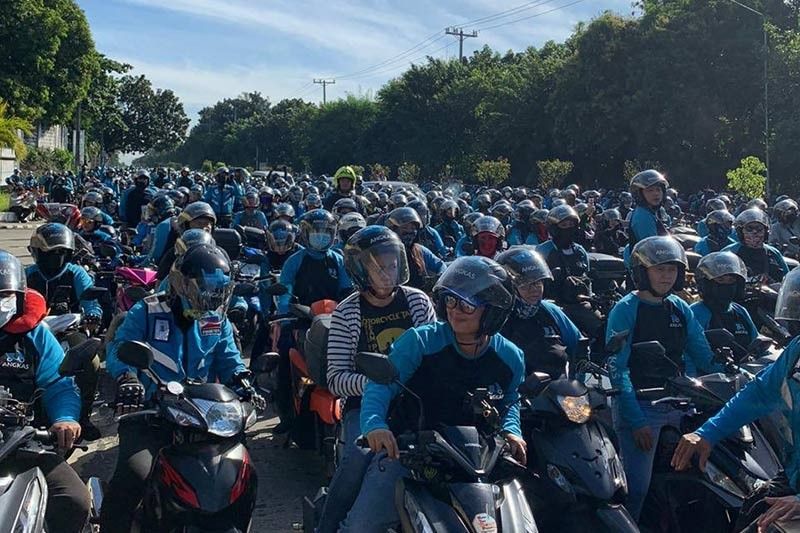Palace releases guidelines on motorcycle taxi operations

MANILA, Philippines — Motorcycle taxi services like Angkas have the green light to hit the road once more, eight months after they were first suspended amid the coronavirus pandemic.
At a press briefing Tuesday, presidential spokesperson Harry Roque said that the National Task Force against COVID-19 had released its operational guidelines for motorcycle taxi and tricycle backriding.
Among these, he said, are speed limits of 60 kph, the good health condition of drivers participating in the study, protective gear for both drivers and passengers, and data privacy for users of taxi apps.
Under the operational guidelines, all motorcycle taxi drivers participating in the pilot are required to refuse the following passengers:
- Those under the influence of alcohol, drugs, and other banned substances
- Persons with disability who cannot hold on safely
- Children covered by R.A. 10666 or the Children's Safety on Motorcycles Act of 2015
- Pregnant women
- Anyone not complying with required motorcycle passenger health protocols
With the resumption, passengers are also required to bring helmets fitted with a visor when riding motorcycle taxis.
To recall, the prohibition of the motorcycle taxi services came after the trial, participated by ride-hailing platforms Angkas, Joy Ride and MoveIt, officially ended in March.
Since then, talks of a possible continuation were only further delayed by the suspension of public transportation under the coronavirus-induced community quarantines.
Pre-pandemic, motorcycle cycle taxis quickly became popular options for commuters amid what many called a mass transportation crisis in Metro Manila—calls that have carried over to the coronavirus pandemic as well, with most of public transportation operating under reduced capacity.
Restrictions for PWDs?
Some on social media voiced their concern on the restrictions for PWDs "who cannot hold on safely."
According to Republic Act No. 7277 or the Magna Carta for persons with disabilities: "It shall be considered discrimination for the franchises or operators and personnel of sea, land, and air transportation facilities to charge higher fare or to refuse to convey a passenger, his orthopedic devices, personal effects, and merchandise by reason of his disability."
In an online exchange with Philstar.com, Alyansa ng may Kapansanang Pinoy, Inc. member and PWD advocate Maureen Mata said that the wording of the restriction was vague.
"They need to specify first what disabilities aren't allowed. But there should be a boundary, unless they're saying this includes all disabilities," she said in mixed Filipino and English.
"If public transportation were sufficient and accessible, and traffic congestion was controlled well and it wasn't multi-transport per individual, we wouldn't need to ride on motorcycle taxis in the first place," she also said.
Mata, herself an amputee who lost her leg to bone cancer, was among the advocates and commuters under the Move as One transport coalition who reminded the transportation department in an earlier Philstar.com story to include vulnerable sectors, particularly persons with disability, in its plans for transportation in the 'new normal' post-lockdown.
“Ito ba ay mga walang kamay, naka wheelchair, nakasaklay o may ortho or mobility disability. Need lang maging clear if may specific disability ang irerefused. Kasi precovid nirerefused na ang mga persons with disabilities ng motorcycle taxis,” she added.
Her sentiments were shared by Arpee Lazaro, president of PWD Philippines, who also offered a qualifier for the rule.
"If the PWD does not have hands to hold on with or a state of mind that may endanger both the passenger and the driver then it seems logical that they not be allowed since there are other modes of transportation available, like cabs, tricycles, jeeps, and buses where people without hands may be able to ride without falling off the vehicle. The same is true for pregnant women and very young children," he said in a text message.
"What should be looked into is their insistence on the use of the barrier which is not aerodynamic and can pose untold dangers to the riders at speeds higher than 30 kph," he also said.
RELATED: Whatever happened to: Anti-COVID motorcycle barriers
He was referring to the motorcycle barrier for pillion riding that experts say may dangerously affect a motorcycle's aerodynamics.
Despite the continuation, the Joint Task Force COVID Shield, which enforces quarantine protocols for the IATF, will still be enforcing the usage of the barriers moving forward, its commander told Philstar.com earlier.
- Latest
- Trending



























